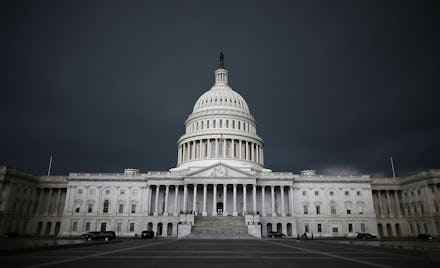New Study Reveals Income Inequality Is the Real Reason American Politics Is So Broken

Why is the government broken?
It depends on whom you ask. When attempting to diagnose the reasons that Congress has steadily grown more polarized since the 1970s — now at levels of dividedness that haven't been seen since the early years of the 20th century — there is no consensus among political scientists or pundits.
Gerrymandering, the maneuver by which political boundaries are redrawn to favor one party over another in elections, is a popular culprit. The radicalization of the contemporary Republican Party is another common explanation.
But one factor that's far less commonly discussed in popular conversation is rooted much more deeply in our society: skyrocketing income inequality.
The growing gulf between the rich and the poor has been shown by academics to correlate with political polarization in the past, but it's been enormously difficult to establish causal links between the two phenomena.
But a new study by professors at the University of Oregon, Princeton University and Georgetown University has made a compelling breakthrough on this front. Examining data from state legislatures across the country, the researchers found there's a strong causal link between increasing income inequality and widening rifts between state political parties.
The study is specific to state-level data, but the phenomenon it highlights is of tremendous importance for understanding the ripple effects of economic inequality. It also means that an economy designed to serve the 1% is poisoning the very institutions that are needed to reform it.
The study: Using newly available data on state legislatures and inequality, the study finds inequality on the state level has a number of effects on state politics.
The first map below shows the change in income inequality in the states between 1997 and 2012, as described in the study. The second map shows the level of polarization in each state over the same time period. The shift is subtle, but as a state takes on a deeper hue of green, it also grows more polarized:
What happens when a state grows more unequal? The researchers found that higher inequality increases the probability that Republicans are elected into office. State legislatures move to the right as Republicans secure more seats. Many of the seats they pick up were once held by moderate Democrats, who become something of an endangered species in this climate.
While there are more Republican legislators, the study did not find strong evidence that new members shift the party's ideology to the right. However, the median ideology for Democrats, whose moderate ranks have been depleted, drifts leftward.
In short, inequality causes a rightward shift in statehouses, and Democrats dig their heels in ever more deeply as they lose power and become more desperate to institute liberal policies designed to combat inequality.
So why exactly is this happening? It's not easy to say.
While the causal link is clear, the mechanisms that explain it aren't. But there are some hypotheses the authors are considering exploring in their future research.
"An influx of campaign funds going to politicians who are going to be more favorable to the wealthy when there's an increase in inequality might be just enough to flip a district that once elected a moderate Democrat into one electing a Republican," John Voorheis, the lead author of the study, told Mic.
But a change in the financing landscape is just one potential factor among many.
"There's also the possibility that there could be a reaction by the electorate itself," Voorheis explained. "Something about inequality causes people to become more right wing — and that could work through the media, potentially."
What if people just tend to grow more skeptical of liberal policy when at least some of society seems to be faring very well? Or, alternatively, do they grow more hostile to redistribution when they think those at the bottom will benefit from taxation on an already-struggling middle class?
The takeaway: State legislatures are not the same as Congress, and some of the dynamics are different. There is, for example, evidence that Republicans have become more partisan and less compromising than Democrats in Congress.
But it seems highly likely the underlying factors related to inequality that are producing a bigger gap between the parties on the state level are producing them on a national level as well. It's just extremely difficult to prove that with Congress, because, unlike with the states, which can be compared to each other to weed out confounding variables, there's no control group to compare to Congress. For now, our understanding of the relationship between inequality and polarization on the national level will remain one of correlation.
The consequences of extreme inequality on the political process present a nefarious catch-22: Politicians must work together to assemble the major coalitions needed to fight inequality, but it may be precisely because of inequality that they can't get their act together. As the chasm widens further, more and more ordinary Americans will be swallowed up by the absence of action.
h/t Washington Post